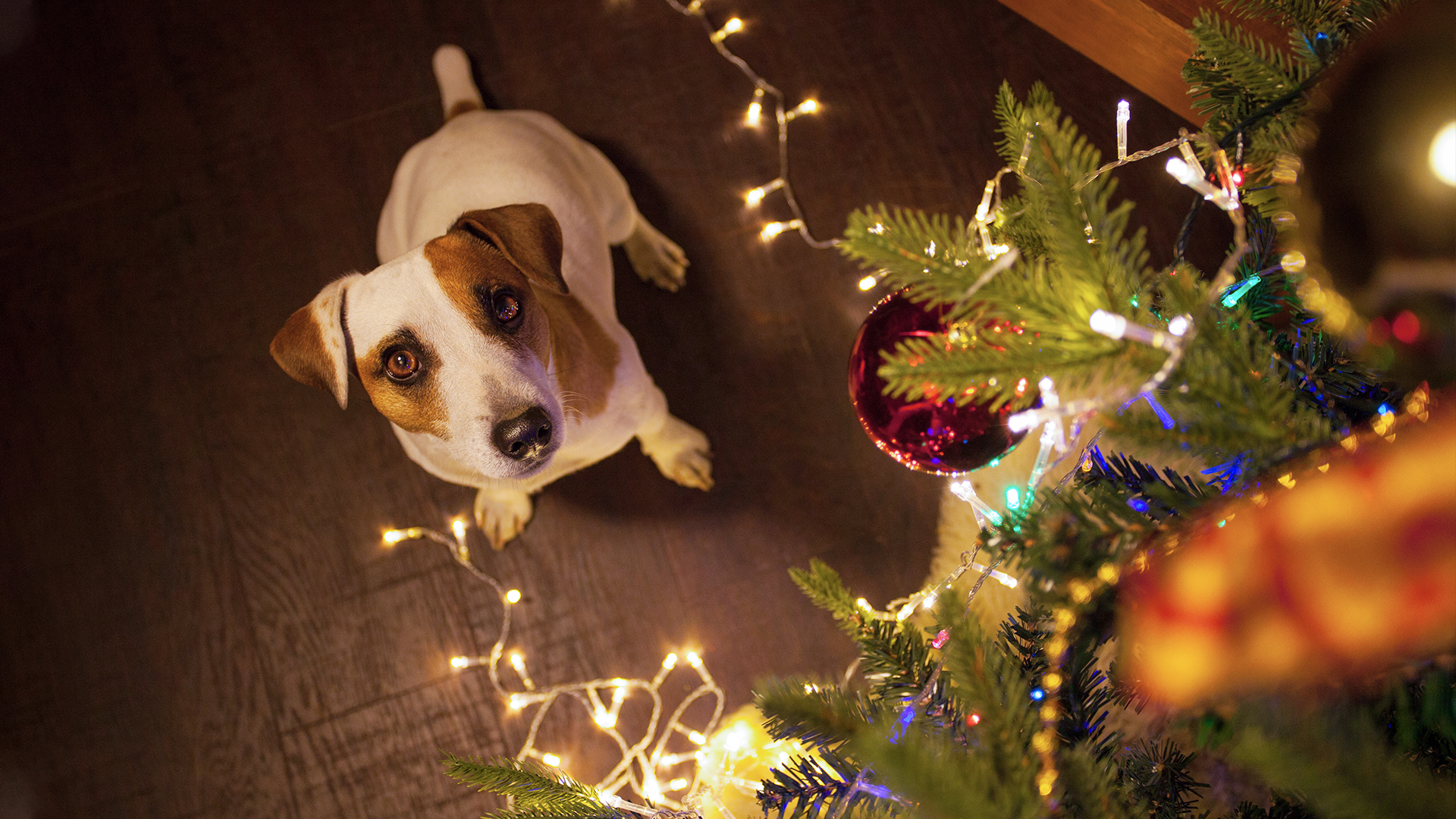We at Robinson Veterinary Services want you and your pets to have a fun, joyous, safe, and healthy holiday season. Yet we also realize that you’ve likely got lots of shopping, planning, wrapping, cooking, and other things still to do — and that’s before the blur that is Christmas Day even arrives!
To help, we’ve put together for you this list of 12 common Christmas pet hazards.
Tinsel: Very common cause of digestive obstruction this time of year, especially in cats. Should be kept out of homes with cats. Not worth the risk.
Fruitcake: Between the yeast used in the cooking, the raisins and currants commonly included, and the alcohol that’s sometimes involved (either in cooking or in drinking to stomach the taste), these “gifts” can prove quite dangerous for your cats and dogs.
Mistletoe: Ingestion of small quantities can lead to excessive drooling and digestive upset, while larger quantities can lead to heart rate and rhythm problems (arrhythmias) or neurologic issues. Hang it high and remove the berries to improve safety.
Batteries: Batteries are everywhere at Christmas time – from the presents to people’s keychains and cell phones, and much more. While alkaline batteries can cause burns (if chewed) and obstruction even if swallowed whole, it’s the smaller “button” or “disc” type batteries that easily cause more severe, more-likely-to-be-fatal burns in a cat’s or dog’s esophagus.
Lilies: Though lilies are primarily a very significant concern for cats, this is a hazard that everybody should be aware of and cautious with. After all, it’s not just cat owners who are likely to bring or send you flowers at the holidays. True lilies cause kidney failure in cats — and it’s not just the flower, but also its the pollen and the vase water that are dangerous.
Ornaments: Broken glass, swallowed ornaments, and the ornament “hangers” can all wreak havoc for a cat or dog’s digestive tract. And the broken glass isn’t fun for their delicate paws, either.
Light Strands: Positively shocking! Not only can a pet’s bite into a stand of lights cause an uncomfortable burn in their mouth, it can also cause seizures and a dangerous build-up of fluid in their lungs. And, as if that wouldn’t be bad enough, such bites have also lead to house fires.
Chocolate: Sure, you’ve heard of the dangers of chocolate for dogs and cats, but do you know which types of chocolate are the worst? Have you thought of all the ways in which chocolate makes it into your home this time of year? Beware of dark chocolate or bakers chocolate, these contain this highest levels of theobromine which causes seizures in dogs. Milk chocolate is much safer and much more needs to be consumed to cause issues.
Wrapping Bows & Ribbons: Like tinsel, wrapping bows and ribbons are a very common and dangerous cause of digestive obstruction in pets this time of year. Given their innate curiosity, cats are typically at higher risk, but plenty a dog has had this unfortunate experience, too. Be sure to properly and promptly dispose of all wrapping.
Liquid Potpourri: The detergents in most liquid potpourri can cause significant digestive or breathing problems for the pet unfortunate enough to lick any of it up. And you also need to be careful with the candles that are usually used to warm these liquids.
Cyclamen: Commonly sold at grocery stores and garden centers, these beautiful plants can cause excessive drooling, digestive upset, and heart problems for pets that decide to take a taste.
House-guests: Because of all the things they bring into your home at the holidays, you can lessen the danger by ensuring that people hang all their coats and purses well out of reach of the pets, keep their bedroom and bathroom doors closed, and asking them not to feed your pets anything from the table (or anything in general).
And finally, about those “evil” Poinsettias… While they can cause some mild digestive upset for the cat or dog that nibbles them, they’re not nearly as deadly as you’ve likely read or been lead to believe. The fear all stems from an unsubstantiated suspicion from the early 1900s that a small child died from eating a Poinsettia leaf. So these staples of Christmas decorations need not be banished entirely from your holiday table.
Have a safe and very Merry Christmas and a fantastic New Year!
From your friends at Robinson Veterinary Services
Information provided by Preventive Vet


